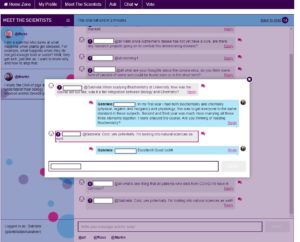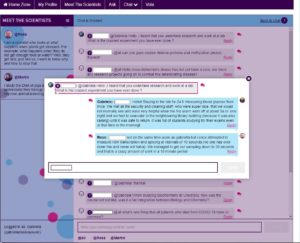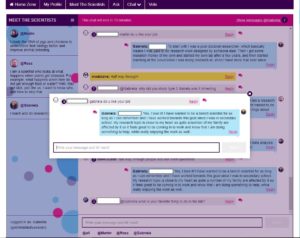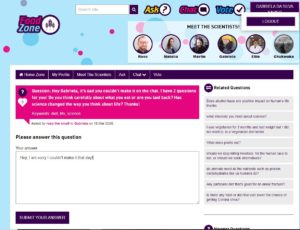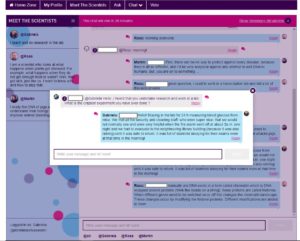
Earlier this year, Dr Gabriela Da Silva Xavier took part in “I’m a Scientist Get Me Out of Here!“… or as it’s now called during lockdown, “I’m a Scientist, Stay at Home!”
Gaby is a senior researcher in the IMSR, who studies cellular metabolism with a special interest in glucose sensing mechanisms in the pancreas and how this may play a role in diabetes and obesity.

Here’s the story of her recent public engagement experience with school children:
“I’m a Scientist, get me out of here” for British Science Week has come and gone and I am in reflective mode at the moment. Over 2000 school children participated in the event. I am currently stuck at home in the midst of the coronavirus crisis and the current quietness is a stark contrast with the last two weeks of daily rapid fire communications with school children.
But let’s start from the very beginning. What is “I’m a Scientist, get me out of here”? I found out about this activity via our university newsletter. This is an online programme whereby scientists from across the scientific disciplines are placed in chatrooms to answer questions posted by secondary school children for two weeks. The children can ask anything they want and, as shown in the pic above, questions can be quite wide ranging. The idea is to communicate science and enrich science education at school, and to talk about what it is like to be a scientist. The schools book 30 minute slots during the school day to chat with us; in the evening, the children can log in to a one hour early evening slot themselves to chat with the resident scientists. All of this happens in moderated chatrooms. It did take little chunks out of my working day but they were not hard to work around.
I love working with children- I was previously heavily involved in community sports for children- but one of the great things about this programme was that I met a bunch of interesting scientists as well. The children were primarily interested in our research and, aside from asking questions that were directly related to our research area, also wanted to know what it means when someone says they are a university lecturer or a research scientist: what do you actually do? There were some science questions, some questions related to how we came to do what we do, and corona virus (of course). The children were also interested in what scientists did outside of work, and some of them seemed (pleasantly) surprised that we like to do things that they like to do too- e.g. I met a fellow rock climber.
Time just flies by in the 30-60 minutes chats because the children had a long list of questions and the sessions were interactive- the children can post follow-on questions to the questions that had been answered, and all the scientists can chip in on a question that we can all answer, leading to some interesting threads! We don’t talk, and we don’t see the participants live, and initially I wondered whether using threaded messages alone would make the exchanges a bit stilted. In fact, it didn’t. Once the chats started we were kept busy with animated exchanges for the whole time. The fact that both educators and children can do remote learning with ease is great; the fact it is fun for the participants is excellent.
The folks at “I’m a Scientist, get me out of here” has just been in touch to ask participants to help with an extended programme during the school break brought about by the corona virus crisis. This is an excellent idea and I am all too happy to participate.
– Gaby
For further information, check out the website on how to apply.

